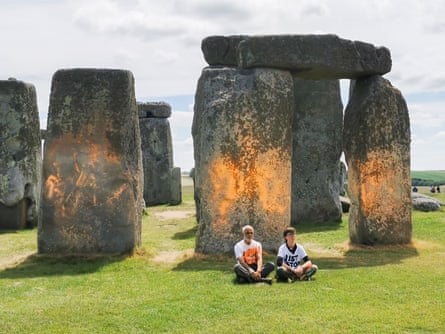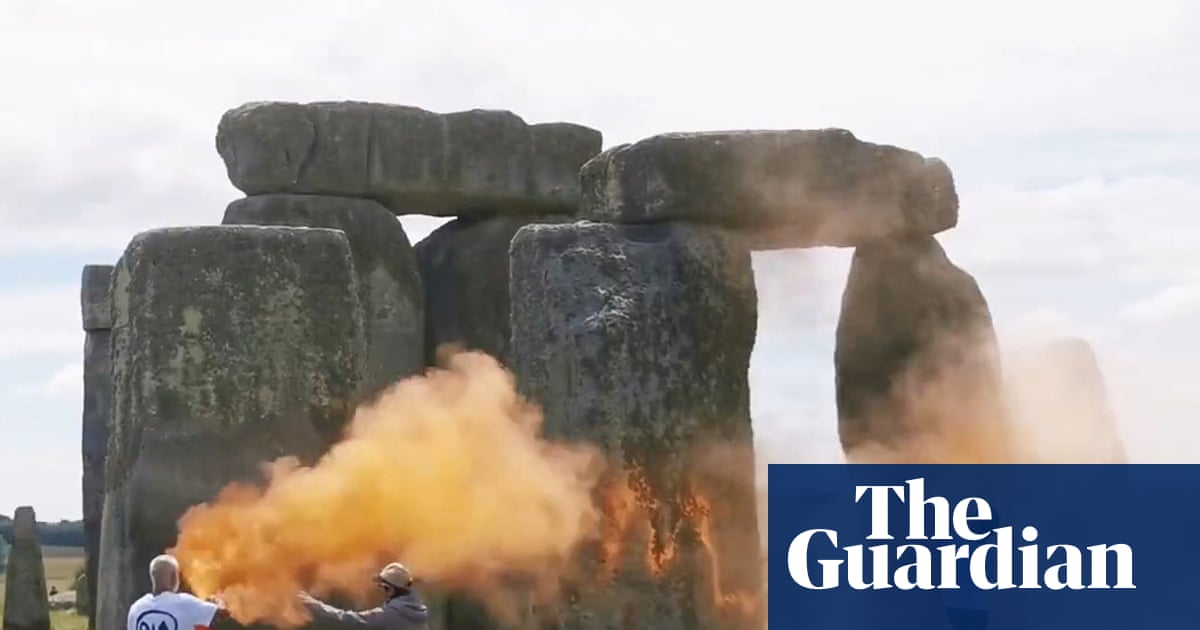PROTECT YOUR DNA WITH QUANTUM TECHNOLOGY
Orgo-Life the new way to the future Advertising by AdpathwayOver the years, Just Stop Oil activists have carried out headline-grabbing actions at sporting events, art galleries and motorways, but it was their protest at Stonehenge that attracted the most attention globally.
As the trial of the three JSO activists who led the action ended with their acquittal, they described their pride at their “magic trick”, insisting it was a proportionate response to the climate emergency and criticising the “insane” law under which they were prosecuted.
“Our intention was never to damage the stones,” said Rajan Naidu, 74, who describes himself as a campaigner for human rights, social justice and peace. “We deeply value and revere this monument as much as anyone else. It’s part of everyone’s heritage and there’s no circumstance under which we would damage it.”
He added: “But we are facing an existential crisis. We’ve just seen Hurricane Melissa cause appalling devastation and loss of life. We can’t do much – we’re tiny people – but we are trying to compel our establishment, our leaders, to take positive action to mitigate the great harms which are coming.
“We’re on the same side as David Attenborough, George Monbiot, Greta Thunberg, Jane Goodall – people who care, people who are peaceful.”
The JSO activists – Naidu, Luke Watson and Niamh Lynch – targeted the monument in Wiltshire shortly before the summer solstice last year, using “colour blasters” to spray orange powder, made of cornflower and food dye, over three of the great stones. The powder was quickly removed at a cost of £620.
Watson, 36, a carpenter, said JSO had checked that the stones were non-porous and so would not absorb the powder. “We were very confident that it wouldn’t cause any damage or harm anybody that was there,” he said.
“It’s a bit like a magic trick. Let’s say you’re a magician – you do the trick, or you cut the lady in half, but there’s a brief moment where everyone thinks that is what you did and that’s what gets the attention.”
Watson made the point that the magician would not be accused of GBH but, though there was no lasting impact on the stones, the three were charged with damaging a public monument and causing a public nuisance under section 78 of the Police, Crime, Sentencing and Courts Act 2022.

The public nuisance offence, which carries a jail term of up to 10 years, was brought in under the Conservative government and has been criticised widely as an attack on the right to protest.
In this case, the prosecution at Salisbury crown court argued the three JSO activists were guilty of the offence because they caused “serious annoyance” to a section of the public.
Lynch, 23, a master’s student in ecology at the University of Exeter, said that offence was “insanity”. She said: “If it was universally agreed that we should be pursuing every possible action to stop the climate crisis, we wouldn’t be needing to protest this. And by very virtue of the fact that it’s not universally agreed, there will be someone, somewhere who disagrees. That’s the case in any matter that needs to be protested. The idea that that is then a crime is quite scary.”
Lynch added that at a time when “genocide” was taking place in Gaza and being livestreamed to the world, the idea they were being prosecuted for causing “serious annoyance” was “bonkers”.
All three said they had no regrets about the action and were proud of one other.
During the protest, Naidu handed police a piece of paper saying: “Fossil fuel non-proliferation treaty now!” He said: “As a result of this action, people will have looked that up. We’re not fanatics saying we’ve got to stop everything. We’re saying there must be a just transition, a green transition. It can be done. We must make a transition to something which is survivable.”
The trio said they hoped the focus would move away from the protest and on to the substance of the climate emergency. Naidu said: “We want people to talk less about Stonehenge but to elide to the fossil fuel treaty, the climate and ecological crisis, the sixth mass extinction.”
But one final word on the stones.
The three also said humans had begun building Stonehenge about 5,000 years ago. But would the stone circle last another 5,000 years – and would there be any people to wonder at them?
Lynch said: “Those stones are the legacy of people that lived 5,000 years ago, and I think it begs the question of what will our generation’s legacy be? What will people living in 5,000 years’ time make of this generation?”
Naidu’s conclusion was bleak: “Nobody will be here to look at the stones, whether they’re here or not.”


 13 hours ago
3
13 hours ago
3



















 English (US) ·
English (US) ·  French (CA) ·
French (CA) ·